Personalized Learning to Optimize Language Outcome
Patrick C. M. Wong
Stanley Ho Professor of Cognitive Neuroscience, Professor of Linguistics and Director of Brain and Mind Institute
The Chinese University of Hong Kong
Abstract:
Individual variability in language learning outcomes has puzzled researchers and practitioners who seek to create optimal learning environments for students. In this presentation, I will discuss the framework of “Personalized Learning,” which seeks to identify genetic, neural and behavioral predictors of individual differences in language learning and aims to use predictors to help create optimal instructional paradigms. I will present research findings across several aspects of language learning to illustrate the association between biological variability and language learning variability. I will then provide very preliminary evidence on how biological variability interacts with instructional paradigms. Personalized Learning provides a promising avenue for optimizing not only language but also other types of learning and treatment of behavioral disorders.

Patrick C. M. Wong
Patrick C. M. Wong holds the Stanley Ho Chair in Cognitive Neuroscience, is Professor of Linguistics and Professor of Otolaryngology (by courtesy), and serves as the Founding Director of the Brain and Mind Institute at The Chinese University of Hong Kong. Prior to joining CUHK in 2013, he was a tenured faculty at Northwestern University where he had begun his faculty career a decade before. After undergraduate and graduate training in linguistics and cognitive psychology at the University of Texas at Austin, Wong completed a postdoctoral fellowship in neuroscience at the University of Chicago Medical School in 2003. During the same period, he also received clinical training in speech-language pathology and is licensed to practice in the State of Illinois. He is admitted to full (registered/certified) membership of the Hong Kong Institute of Speech Therapists and the American Speech-Language-Hearing Association. A versatile and effective teacher, research mentor, and clinical educator, Wong is a two-time recipient of the Faculty Outstanding Teaching Award at CUHK.
As a cognitive neuroscientist, linguist, and speech-language pathologist, Wong’s research covers a wide range of basic and translational issues concerning the neural basis and disorders of language and music. His work on language learning attempts to explain the sources of individual differences by focusing on the neural and neurogenetic markers of learning. His work on the association between language and music provides evidence for the neurophysiological mechanisms behind such an association at the auditory brainstem. In what is now considered traditional phonetics, Wong’s research addresses phonetic constancy and representation, as well as phonetic learning. For over a decade, his research team has been funded continuously by the National Institutes of Health in the US, with current funding from both US and Hong Kong sources. He has also served on funding agency review panels in Hong Kong and the US, including the Research Grants Council (RGC) (Hong Kong), the NIH, and the US Department of Veteran Affairs. His research has appeared in a broad array of interdisciplinary scholarly venues covering both neuroscience and language works including journals such as Nature Neuroscience, Proceedings of the National Academy of Sciences of the USA, Journal of Neuroscience, Neuroscience & Biobehavioral Reviews, and Journal of Speech, Language, and Hearing Research. He was awarded the Independent Scientist Award and the Humanities and Social Sciences Prestigious Fellowship by the NIH and RGC, respectively. Wong’s research has also received public attention from media outlets such as The New York Times and The Wall Street Journal, and the British Broadcasting Corporation/Public Radio International.
Neural deficits in second language reading --(f)MRI evidence from Chinese children with English reading impairment
Guosheng Ding
State Key Laboratory of Cognitive Neuroscience and Learning & IDG/McGovern Institute for Brain Research, Beijing Normal University, Beijing, 100875, P.R. China
Abstract:
Previous studies have extensively explored the neural basis of reading difficulty in the first language (L1). However, it remains less clear whether difficulty of the second language (L2) has the same or different neural correlates with that of L1. Using magnetic resonance imaging, we explore this issue with Mandarin-speaking children learning English as a second language. We compared local and connectional brain activity in children with L2 reading difficulty and typically developed children, and found L2 impaired readers showed similar neural deficits as English native impaired readers. We further examined the structural correlates of L2 reading impairment, recruiting children with reading difficulty in L2 and L1 and children with reading difficulty only in L2. The results showed that reading difficulty in English (L2) is associated with a structural abnormality in the left supramarginal gyrus, a region implicated in phonological processing, which is independent of reading abilities in the native language. These findings deepen our understanding of the neural deficits in Chinese children suffering from second language reading difficulty.
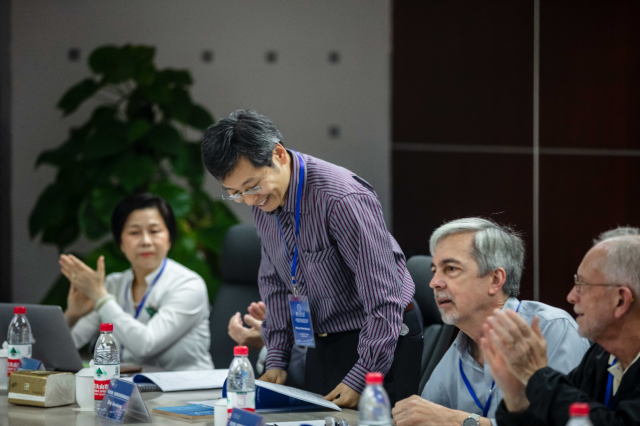
Guosheng Ding
Ding Guosheng is a professor in cognitive neuroscience, working in the National Key Laboratory of cognitive neuroscience and learning, Beijing Normal University. He once was an academic visitor in the University of New South Wales in Australia, Cambridge University in UK and San Diego State University in the United States. His main research fields are brain mechanism of bilingual language processing, language learning and brain plasticity. At present, he is the editorial board member of "Bilingualism: Language and Cognition", and the standing council member of the psycholinguistics Committee of the English-Chinese Comparative Research Association, China. He has hosted several projects from National Natural Science Foundation of China (NSFC), and published more than 60 research papers in domestic and international journals, including Cerebral Cortex, Neuroimage, Brain and language, Bilingualism: Language and Cognition et al.
Brain, musicality and language aptitude, a complex interplay developmental perspectives on the correlations between stable anatomical and other cognitive predictors for language and speech abilities
Sabrina Turker1,2 and Susanne Reiterer2
1. Max-Planck-Institute for Human Cognitive and Brain Sciences, Leipzig, Germany
2. Department of Linguistics & Teacher Education Centre, University of Vienna, Austria
Abstract:
In a decade of past research, we have successfully established and corroborated the knowledge that individual musicality levels (expressed by singing, instrument playing and/or perceptive musical abilities) of individuals significantly influence foreign language learning abilities, especially phonetic and phonological skills (e.g. pronunciation, speech imitation). Musical expertise interrelates strongly with speech abilities, almost like working memory does. We could also establish a series of possible brain markers (anatomically and functionally) which are characteristic of speech imitation abilities and overall language aptitude (e.g., left and right auditory cortex, inferior parietal areas and the premotor cortex). On the functional level, higher efficiency of processing in left parietal plus premotor cortical areas and increased left white matter anatomical fibre connectivity in the arcuate fascicle were associated with high language learning abilities.
In two recent studies, we further tested whether neuroanatomical markers are a potential predictor of foreign language aptitude. In the first study, musicality, music expertise and working memory were investigated as a function of language aptitude in adult learners, while the second study with school children (aged 10-16) tested the relationships between these abilities and brain variables plus IQ, socio-economic status, school performance, self-concept and arithmetic competence. Both studies revealed a strong relationship between language aptitude and right-hemispheric auditory cortex morphology. Adults and children with high language aptitude scores possessed more complete posterior duplications in their right auditory cortex. Conversely, subjects with low aptitude more frequently possessed single gyri in their right auditory cortex. On the cognitive behavioural level, significant correlations, once again, between working memory and language aptitude were found, while a somewhat weaker link between musical expertise and language aptitude could only be corroborated in the study with adults. In the child population, scores on the arithmetic competence test, school performance and aptitude self-concept correlated with language aptitude, independently of general IQ and socio-economic status.
The new findings suggest an intricate link between right auditory cortex morphology (gyrification and grey matter volumes) and language aptitude, which points into the direction of language aptitude being a more stable trait than often assumed. These neuroanatomical duplications are already established around birth and were found to be stable over long periods of time (several years). Thus, this adds further neuroscientific evidence for language aptitude as a more stable trait and musicality and musical expertise (being so intricately interwoven with language aptitude already at a brain anatomical level), as a possible new candidate factor for being included into the language aptitude dimensions.

Sabrina Turker
Sabrina Turker (Ph.D., University of Graz) recently finished her PhD thesis about 'The neuroanatomical correlates of foreign language aptitude and musicality' at the Centre for Systematic Musicology, University of Graz, supported by a DOC-team fellowship of the Austrian Academy of Sciences. Having worked for several years as a foreign language teacher, her main research interests comprise foreign language learning (including language aptitude), reading development & disorder (dyslexia), arithmetic skills and school achievement in children and teenagers. She is now working as a postdoc in Max-Planck-Institute for Human Cognitive and Brain Sciences, Leipzig, Germany exploring reading processing through fMRI and TMS.

Susanne Reiterer
Susanne Maria Reiterer (Ph.D., University of Vienna) is currently Associate Professor at the Linguistics Department and Centre for Teacher Education at the University of Vienna. She has research interests in cognitive neuroscience of multilingualism and second language acquisition, aiming to contribute to improvements in language learning/teaching methodology. Despite a general interest into the “neurobiology of language” and brain imaging (fMRI and EEG) one of her main interests centers around hyper-polyglottism and individual differences in language talent (native and foreign language aptitude) and how this relates to linguistic theory. Dr. Reiterehas published widely in top-notched journals in linguistics, psychology, and neuroscience, such as Cortex, Frontiers in Psychology, Brain and Language, Bilingualism etc. Her books include "Language Talent and Brain Activity" (Mouton de Gruyter, 2009) and "Exploring Language Aptitude: Views from Psychology, the Language Sciences, and Cognitive Neuroscience " (Springer, 2018).
Structural priming as language aptitude: An implicit learning account
Cai Zhenguang
The Chinese University of Hong Kong
Abstract:
Structural priming refers to the tendency for people to repeat syntactic structures that they have previously heard or produced. Such a tendency has been shown to reflect implicit learning of syntactic structures during language communication. In this talk, I will review studies in support of this account; more importantly, I will further argue that structural priming can be viewed as an aptitude of syntax in a foreign language.
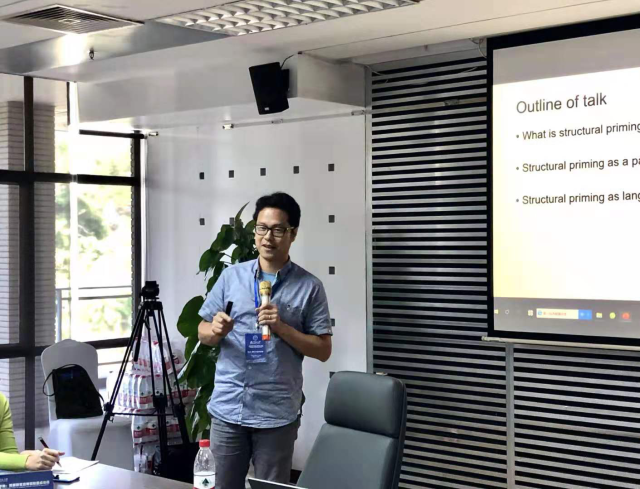
Cai Zhenguang
Zhenguang Cai, PhD, associate professor/PhD supervisor. After receiving his PhD from University of Edinburgh, he was funded as an ESRC (UK) Future Research Leader fellow at UCL. He is currently an associate professor at the Chinese University of Hong Kong. He has published more than 20 journal papers in internationally indexed journals such as Cognitive Psychology and Cognition. His research focuses on mechanisms of language processing, lexico-syntactic representations in bilinguals and the interaction between space and time.
The elephant in the room: Is language aptitude innate or acquired through experience?
Niclas Abrahamsson
Centre for Research on Bilingualism
Stockholm University
Abstract:
Not too long ago, the archetypal definition of ‘language aptitude’ was that of a normally distributed, innate, and fixed talent for language learning, distinguished from, and independent of, other cognitive as well as non-cognitive traits, abilities, and functions. However, with recent, fast-growing insights into human cognition, in combination with a renewed interest among SLA researchers in language aptitude, many aspects of this definition are currently being seriously challenged. Still, while some overlapping is indeed being documented between language learning ability, musical aptitude, working memory, meta-linguistic awareness, even general intelligence, the concepts of innateness and fixedness have remained relatively unchallenged – at least empirically.
The present talk will present some original data on the cognitive advantages found in blind individuals, potentially casting doubt on language aptitude as something innate, stable, and immune to experience. In a study of 80 L1 and L2 speakers of Swedish, of whom 22 were early blind, 18 were late blind, and 40 were sighted, we show that (especially early) blind participants outperformed sighted participants, not only on the more traditional digit span and nonword repetition tests, but also on the auditory-based language aptitude subtests Lat A (from the Swansea Language Aptitude Tests; Meara, Milton & Lorenzo-Dus, 2003) and Llama D (from the Llama Language Aptitude Tests; Meara, 2005). In fact, some of the congenitally/early blind individuals’ performances were of the extraordinary kind. However, there should be no reason to believe that blind individuals are equipped with an innate talent for language learning that goes beyond that of sighted individuals; instead, their exceptional, compensatory skills are clearly due to the extreme, sometimes life-long, experience of lacking vision.
This gives us (at least) two theoretical alternatives: either we (1) reconceptualize language aptitude as a quite flexible ability or trait that can be acquired or enhanced through experience, or (2) hold on to the innateness and fixedness position, but accept (with the ambition to resolve) the ambiguity that arises when our aptitude tests frequently tap also into superficially similar but fundamentally different, experience-based skills. Whichever the solution, a question with far-reaching consequences concerns how we should (re)interpret the hitherto established relationship between high aptitude and adult, nativelike L2 acquisition (see, e.g., Abrahamsson & Hyltenstam, 2008; DeKeyser, 2000). Does the long-term, exceptionally successful, post-critical period learning of a second language qualify (in the same way as blindness) as an exceptional experience with the potential of mediating the performance on language aptitude tests? If the answer is ‘yes’, then the predictive and explanatory power of language aptitude in nativelikeness studies is seriously deflated.
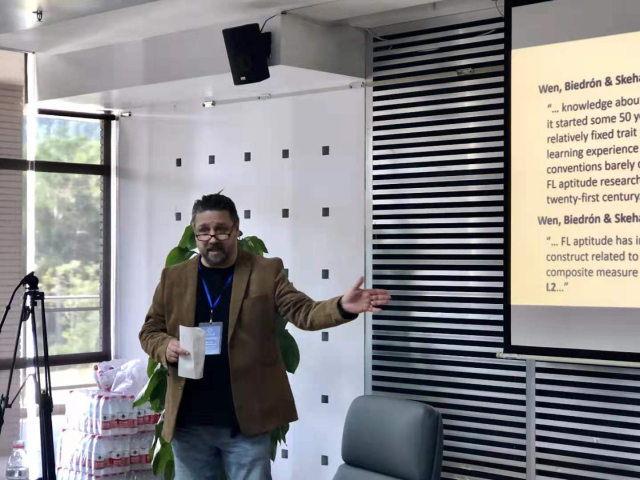
Niclas Abrahamsson
Niclas Abrahamsson is a full professor of Swedish as a Second Language and the current director of the Centre for Research on Bilingualism, Stockholm University. He got his PhD in Bilingualism from Stockholm University in 2001 with a thesis on onset and coda simplification in the interlanguage phonology of Chinese and Spanish-speaking L2 learners of Swedish. His main research interests lie within psycholinguistic and neurocognitive aspects on multilingualism, second language acquisition, and first language attrition, with a specialization towards age effects, maturational constraints, and the critical period hypothesis. A recurrent theme is child-adult differences in language acquisition and loss and their relation to the maturation of the brain and so-called critical periods. Prof Abrahamsson’s current research program includes (1) age of acquisition effects vs. bilingualism effects, (2) the roles of procedural/implicit vs. declarative/explicit memory in near-native grammatical acquisition and processing, and (3) listeners’ perception of non-native speech.
Language aptitude and polyglots
Kenneth Hyltenstam
Centre for Research on Bilingualism
Stockholm University
Abstract:
The presentation discusses the notion of language aptitude as a factor contributing to successful language acquisition achievements in polyglots. The difficulty in distinguishing between what is, indeed, language aptitude and what is language awareness on the basis of language aptitude test results is the main focus of the talk. A polyglot is here operationalized as a person who, after puberty, acquired/learnt at least 6 new languages (L2s), who command at least 6 of his/her L2s at an intermediate or advanced proficiency level (minimally B1 in CEF) and who can presently use these languages relatively unimpededly in oral interaction. The presentation is based specifically on a controlled investigation of ten polyglots who were extensively interviewed and tested for language aptitude, cognitive ability, motivation, language awareness and use of language learning strategies. Results for each of the ten individuals show well above average, often outstanding, aptitude scores, but also an immediate preference for linguistic form and explicit learning and an average to high systemizing ability. Further, results show a high general cognitive ability for the group, as well as an extremely high motivation, especially in terms of choice and executive motivation. It appears that the combination of a strong motivation and high levels of language aptitude and language awareness is what makes polyglots unusually successful second language learners. Their self-responsibility and employment of a variety of strategies, including inventiveness in setting up the necessary conditions for learning and neglecting face-threatening obstacles in taking advantage of conversational opportunities are arguably linked to their high motivation for being involved in language acquisition. It thus seems that it is a synergy of abilities and predispositions that is spelled out as successful second language acquisition among polyglots.
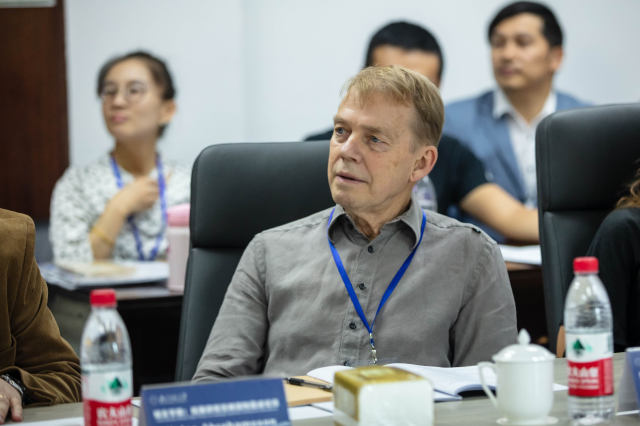
Kenneth Hyltenstam
Kenneth Hyltenstam is Professor Emeritus of Bilingualism at Stockholm University. He has published extensively in the area of second language acquisition, specifically on topics such as age and ultimate L2 attainment, markedness, developmental sequences and variability, but his research also covers other topics within the area of bilingualism such as polyglotism and bilingualism and dementia. In addition, he has contributed to multilingualism in the sociolinguistic and educational fields, where he has engaged in research on language policy and language maintenance and shift with respect to minority languages in Sweden and Norway, and language and education issues in the Nordic context as well as in developing countries, in particular in Mozambique. He served as the Director of the Centre for Research on Bilingualism at Stockholm University 1981–2007 and 2012–2013.
Surveying Current Aptitude Tests: Where are we, and what is needed?
Peter Skehan
Birkbeck College
Abstract:
The last twenty years has seen a welcome resurgence of interest in aptitude, and a range of innovative research designs to explore links between aptitude and acquisitional processes. This has tranformed our approach to the relevance of aptitude. But what has remained fairly constant is the aptitude tests that are available, and how these are drawn on, somewhat opportunistically, in research studies. The presentation will have two general aims. First, it will survey existing tests and explore how they relate to some basic underlying dimensions: the extent to which they are language oriented or general cognition oriented; the focus they have on explicit learning/processing versus implicit learning/processing; and proposed stages within an acquisitional sequence. The range of extant tests will be related to each of these fundamental perspectives to gain an understanding of what the emphases are within each current approach, and what gaps may exist to provide a broader coverage of potential aptitude constructs. Second, and given the previous analyses, a potential new aptitude test will be proposed which attempts to probe the capacity to handle language, specifically, in a post critical period context. The broad claim of the presentation is that the renewed interest in aptitude raises the need to develop a wider range of aptitude tests.
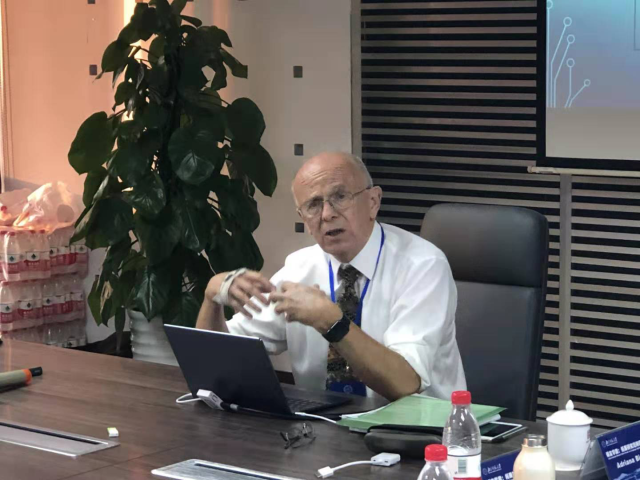
Peter Skehan
Peter Skehan (PhD, Birkbeck College, University of London) is currently an Honorary Research Fellow at Birkbeck College, University of London, and has taught at St. Mary's University College, Twickenham, London, Auckland University, The Chinese University of Hong Kong, King's College London, and Thames Valley University. Professor Skehan’s research interests and extensive publications are in major areas of applied linguistics, such as L2 task-based language teaching & planning research, as well as individual differences in SLA (especially foreign language aptitude). His many books included ‘A cognitive approach to language learning’ (1998) by Oxford University Press, edited volumes include "Researching pedagogical tasks" (2001, Routledge) “Investigating a processing perspective on task performance” (2014, John Benjamins). Recent volumes include: "Second language task-based performance" (Routledge, 2018) and "Language aptitude: Advancing theory, testing, research and practice" (2019, Routledge), and "Task based language teaching: Theory and practice" (2019, Cambridge University Press). Prof Skehan is a recipient of the International Association of Task-Based Language Teaching Distinguished Achievement award.
Fifty Plus Years of the MLAT-E
Daniel Reed, Charles Stansfield
Michigan State University
Abstract:
Stansfield and Reed (2019) presented an overview of the development and 60-year history of the Modern Language Aptitude Test (MLAT), its underlying framework of abilities, adaptations of the test for speakers of languages other than English, and the common uses of the test. Their article provides an understanding of the MLAT that is useful for SLA researchers interested in the role of aptitude in adult second language learning. In recent years, there has been an increase in SLA research on young learners that includes use of the Modern Language Aptitude Test – Elementary (MLAT-E), a version of the MLAT for children of ages 8-11. These studies (cf. Roehr-Brackin and Tellier, 2019 and references therein) reflect a growing interest in studying the role of language aptitude in children’s foreign language learning. Thus, a review of the MLAT-E’s history and approach is useful for SLA researchers interested in measuring language aptitude in children. The MLAT-E, like the MLAT, was developed by Carroll and Sapon (1967) using Carroll’s four-component framework of relevant abilities. As in Stansfield and Reed (2019), the authors will review those four abilities, how they are adapted for children on the MLAT-E, and how the test has contributed to a better understanding of SLA among young school children. In addition, we will examine the adaptations of the MLAT-E for speakers of languages other than English, and how those adaptations have contributed to the SLA literature on young learners who are native speakers of languages other than English.
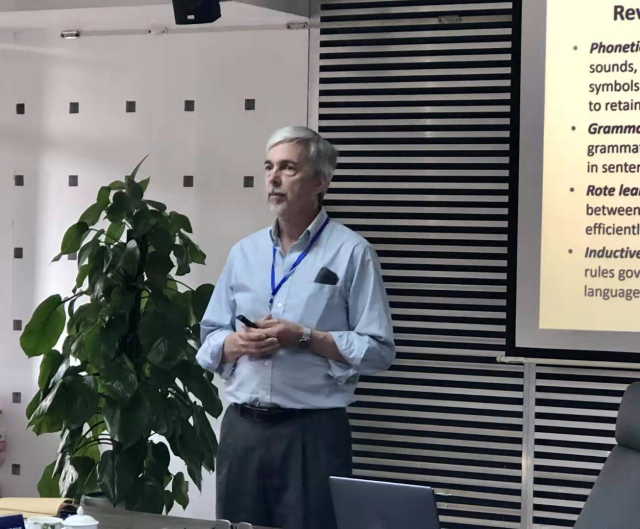
Daniel Reed
Daniel J. Reed, (Ph.D., Indiana University), has served as Head of Testing for the English Language Center (ELC) at Michigan State University (MSU) since 2005. He oversees test administration as well as research and test development in support of MSU’s English exams for incoming international students. Under Dr. Reed’s direction, the ELC provides exams that are used for the following purposes: determining whether international students have met MSU’s English proficiency requirement for admission, placing students into English language classes, and evaluating the spoken English proficiency of graduate students who are nonnative speakers of English and candidates for teaching assistant positions. Dr. Reed has played major roles in the development of proficiency tests in more than half-a-dozen languages and has conducted research on language aptitude and the learning of less commonly taught languages. He also serves on the Board of Directors for the Language Learning and Testing Foundation, which publishes the MLAT and the MLAT-E and other language aptitude tests. In addition, Dr. Reed, along with ELC Director Dr. Susan Gass, has led the development of a large-scale testing program in Greece in collaboration with Anatolia College and the American College of Greece.

Charles Stansfield
Charles W. Stansfield (Ph.D., Florida State University) is president and founder of the Language Learning and Testing Foundation (LLTF). Dr. Stansfield is an authority on second language testing. During his 40 year career, he has been a secondary school teacher of Spanish, a tenured professor of Spanish and teacher trainer at the University of Colorado, a test program administrator at Educational Testing Service, director of the ERIC Clearinghouse on Languages and Linguistics, and director of the Division of Foreign Language Education and Testing at the Center for Applied Linguistics in Washington, DC. He has developed and published proficiency tests in English as a second language and in 15 other languages. He is the author or editor of over a dozen books and research monographs and 50 research articles published in professional journals. Dr. Stansfield is currently a member of the editorial boards of Language Testing and the Journal of Second Language Writing. Since 1994, when SLTI was incorporated, Dr. Stansfield has devoted himself full-time to the management of SLTI projects.
Linking the Language Aptitude Test for Chinese FL Learners with LLAMA Test
Zhao Haiyong, Luo Shaoqian, Fu Ailan
Beijing Normal University
Abstract:
It is now widely accepted that foreign language aptitude serves as one of the most important predictors for second language ultimate attainment. Many a language aptitude battery have been devised in the past half a century along with their validation studies and linking studies, such as the Modern Language Aptitude Test (MLAT) (Carroll & Sapon, 1959) and the High-level Language Aptitude Battery (Hi-LAB) (Linck et al., 2013). Nonetheless, there haven’t been any studies linking Chinese foreign language aptitude tests with the well-established ones.
Thus, this research aims to link the Language Aptitude Test for Chinese FL Learners (LAT-C) with one of the frequently-used foreign tests, the LLAMA Test, or the “MLAT substitute” (Wen, Biedroń, & Skehan, 2017), due to its availability and popularity. Various statistical analysis methods were used to analyze the data including descriptive analysis, correlation analysis, and factor analysis. The results show that : (1) LAT-C is significantly correlated with LLAMA, which means LAT-C has higher concurrent validity with LLAMA; (2) comparing with LLAMA, LAT-C has higher predictive validity.
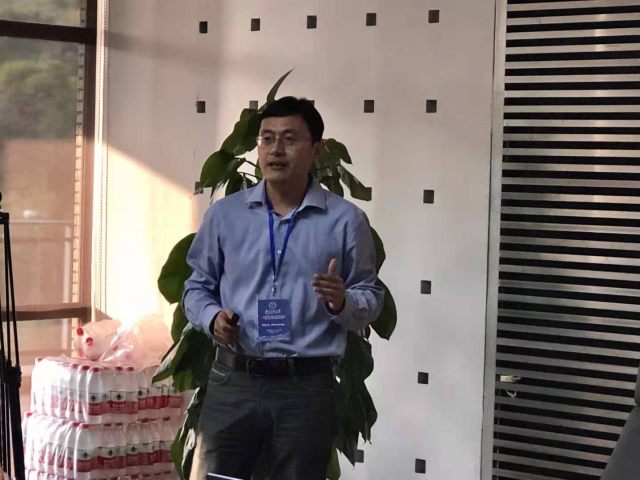
Zhao Haiyong
Zhao Haiyong (PhD, Beijing Normal University) works currently as a postdoctoral researcher in the School of Chinese Language and Literature, Beijing Normal University. His research interests include language testing and assessment, and second language acquisition. Now he focuses on language aptitude tests and application. He participated in the development of China’s Standards of English Language Ability, published one academic book as a co-editor and some papers on language aptitude.
Luo Shaoqian

Luo Shaoqian
Luo Shaoqian, Ph.D. in Applied English Linguistics (CUHK) and professor of English in the School of Foreign Languages and Literature, Beijing Normal University. Her publications include Teaching and learning English vocabulary, Enhancing learning: Formative assessment in L2 teaching, Re-examining Factors that Affect Task Difficulty in TBLA, and Task-based language teaching: Tasks, research, assessment and teacher training. She has been involved in projects of social sciences, including “A longitudinal study of student performance of core competences”, “Task effects in English learning in the Chinese context”, “National Assessment of English Education Quality”. Her research interests include task-based language teaching and learning, language assessment, English teacher education and development.
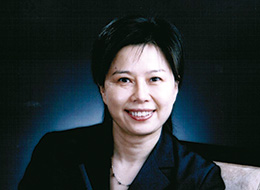
Fu Ailan
Fu Ailan (PhD, Minzu University of China) is currently a Professor in the School of Chinese Language and Literature and Director of Center for Linguistic Sciences of Beijing Normal University. Her research interests include Sino-Tibetan linguistics, teaching Chinese as a second language, language testing and assessment, mandarin teaching in Hongkong. She has published 6 academic books, and 8 textbooks. Her research articles have appeared in journals of language and linguistics, such as Studies of the Chinese Language, Studies in Language and Linguistics, Minority Languages of China, Chinese Linguistics.
Is dependency distance experiencing a process of minimization?
A diachronic study based on the State of the Union addresses
Lei Lei
School of Foreign Languages, Huazhong University of Science and Technology
Abstract:
Dependency distance has been considered a valid measure of syntactic complexity, and it has been extensively investigated in various contexts. One interesting line of research focuses on the issue of dependency distance minimization. Studies have shown that dependency distance has been experiencing a process of minimization in order to adapt to the limited resource of human working memory. However, little is known of whether dependency distance also tends to minimize across a long span of time. If dependency distance tends to minimize, then it should be hypothesized that the minimization process may also occur across a long span of time. To this end, this study investigates the possible change of dependency distance in a diachronic dataset, i.e., the State of the Union addresses from 1790 to 2017. Results of the study confirm the hypothesis that dependency distance has been decreasing across the examined 200 years. Besides, the correlation of mean dependency distance and normalized dependency distance suggests that these two algorithms may serve well as measures of the same linguistic construct, i.e. syntactic complexity.
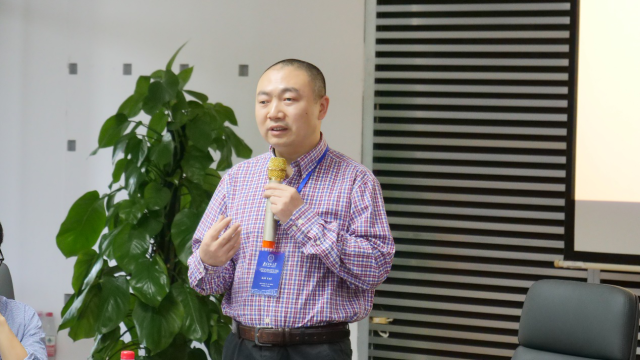
Lei Lei (Ph.D) holds a Ph.D in Applied Linguistics from Shanghai Jiao Tong University and he is currently Professor of Applied Linguistics at the School of Foreign Languages, Huazhong University of Science and Technology. His research interests include corpus linguistics, quantitative linguistics, academic English, and scientometrics. He has published extensively, and his articles have appeared in journals of applied linguistics, library science, and information science, such as Applied Linguistics, Journal of English for Academic Purposes, International Journal of Corpus Linguistics, and Lingua, Journal of Quantitative Linguistics, Scientometrics, and Journal of Information Science.
Working Memory and the Language Device
Lu Bingfu1 Edward Wen Zhisheng2
Beijing Language and Culture University1 Macao Polytechnic Institute2
Abstract:
Recent years have witnessed some general linguistic theories and language processing frameworks subscribing to the cognitive view that language processing is basically a chunking procedure, and that our limited working memory capacity plays a pivotal role in this process. However, most of these language processing theories just incorporate working memory in their frameworks as a constant that does not need to be quantified and operationalized. That is to say, they have largely failed to recognize and acknowledge the complexities and controversies surrounding the working memory construct in current cognitive psychology regarding its nature, structure and functions.
To fill this gap, in this paper, we propose an integrated memory- and chunking-based metric of comprehension complexity, in which we postulate a clear distinction between short-term memory (STM) and working memory (WM) limitations, and that STM limitations of 7±2 (Miller, 1956) are more sensitive to the Instant Chunk Number (ICN) during language processing, while WM limitations of 4±1 (Cowan, 2001) are more sensitive to the mean dependency distance (MDD; Liu, 2008). To further illustrate this potentially important distinction between STM and WM limitations, we will present examples of concrete calculations of our new metric vis-à-vis Liu’s MDD metric, and will discuss related methodology issues. We will conclude the paper by echoing some recently repeated calls (O'Grady, 2012 & 2017; Gómez-Rodríguez et al., 2019; Lei & Wen, 2019; Wen, 2019) to include WM limitations as part and parcel of the language device (LD; cf. Chomsky, 1965, p. 3) and further argue that their impacts are ubiquitous and likely permeate in all essential linguistic domains ranging from phonology to grammar and discourse comprehension and production.
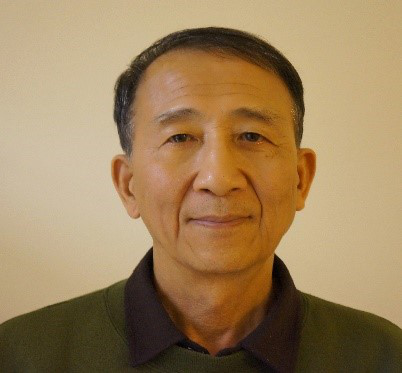
Lu Binfu
Lu Bingfu, Ph.D., is currently a Professor in the Department of Linguistics at Beijing Language and Culture University. Prof Lu obtained his Master degree from Fudan University in Chinese language and characters, a Master’s degree in psycholinguistics from the University of Connecticut, and a doctoral degree in East Asian Linguistics from the University of Southern California. Before moving to Beijing recently, Professor Lu has worked as a professor in the Language Typology Institute of Nanchang University, as a researcher and doctoral supervisor of the Language Institute of Shanghai Normal University, and a part-time doctoral supervisor of Capital Normal University. Prof. Lu’s broad research interests and numerous publications include language typology, Chinese linguistics and grammar, and psycholinguistics. He has published more than 100 papers in Chinese, contemporary linguistics and other major linguistic journals. He is also the editor in chief of Oriental linguistics, the editorial board member of Taiwan Journal of linguistics, sitting in the editorial board of modern Chinese Studies in Japan.
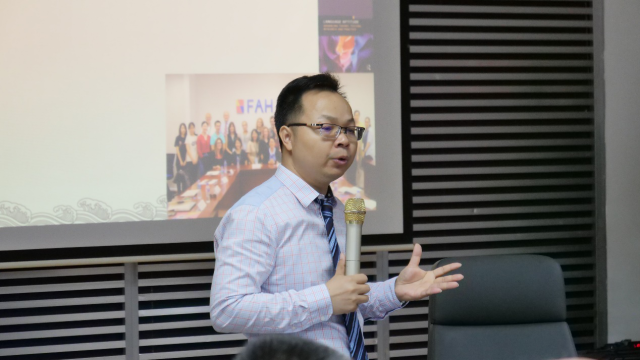
WEN Zhisheng (Edward) holds a Ph.D. in applied linguistics from the Chinese University of Hong Kong (Supervisor: Prof. Peter Skehan) and is currently an Associate Professor in the School of Languages and Translation at Macao Polytechnic Institute in MACAU SAR, China. Before moving to Macao, Dr. Wen had taught over 15 years for undergraduate and postgraduate programs in applied linguistics, psycholinguistics, TESOL, and business writing/financial translation at several major universities in Hong Kong and Guangzhou China.
Dr. Wen's representative publications include a research monograph (“Working memory and second language learning”) published by Multilingual Matters in 2016 and reprinted by Foreign Language Teaching and Research Press in Beijing in 2018; a co-edited a volume with Mailce Mota and Arthur McNeill on ("Working memory in second language acquisition and processing", Multilingual Matters, 2015); guest-edited a Special Issue (on "Working Memory and SLA") of Asian Journal of English Language Teaching (AJELT, 2013 Volume). His recent books include "Language aptitude: Advancing theory, testing, research and practice" (2019, Routledge), "Researching L2 task performance and pedagogy in honour of Peter Skehan", (2019 John Benjamins). Besides papers and special issues, Dr Wen is currently working on several book projects, including "Cognitive individual differences in second language acquisition: Theories, Assessment and Pedagogy" (2020, Mouton de Gruyter); “Cambridge handbook of working memory and language sciences” and “The language learning device reconsidered: How working memory shapes language and bilingualism” both under contract with Cambridge University Press.
Relationships among listening comprehension, working memory, and language aptitude
in an instructed foreign language setting
Sebnem Yalcin, Gulcan Erçetin
Bogaziçi University
Abstract:
This study explores the relationships among second language (L2) listening comprehension, working memory (WM) capacity, language aptitude in an instructed foreign language setting. Participants were late adult learners of English as an L2, with relatively low level of English proficiency. In order to measure working memory capacity, a symmetry span and a rotation span test were administered. Language aptitude was measured with LLAMA. A principal components analysis with varimax rotation showed that LLAMA B and LLAMA F loaded on the same component as the span tasks. This component explained 14 per cent of variability in listening scores. On the other hand, LLAMA D and E together loaded on another component in the PCA but this component did not explain any variability in listening scores. The findings will be discussed in terms of the relationship between language aptitude and working memory as well as their contributions to L2 listening.
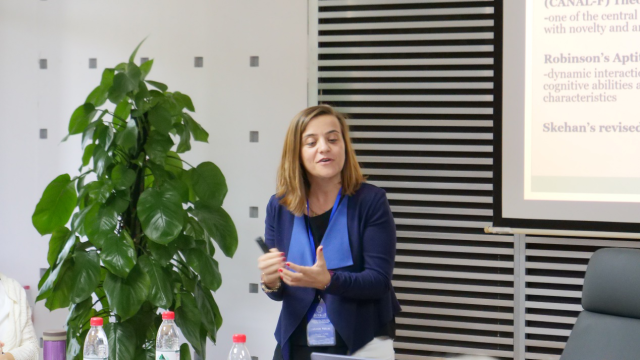
ŞEBNEM YALÇIN received her Ph.D. in Second language education from Ontario Institute for Studies in Education, University of Toronto, Canada. Her research interests include instructed second/foreign language acquisition, form-focused instruction, and the effects of individual learner differences (i.e., aptitude and working memory) in foreign language classrooms. She has been teaching at the Department of Foreign Language Education at Boğaziçi University, Istanbul, Turkey since 2012.
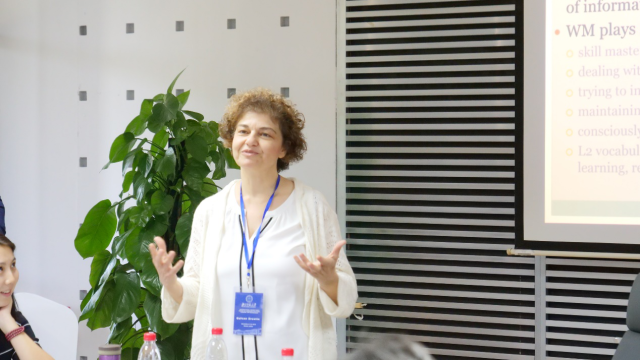
GULCAN ERÇETIN holds a PhD in Language, Reading & Culture from the University of Arizona, Tucson. She is currently a full professor in the Department of Foreign Language Education at Bogaziçi University. Her research focuses on literacy development and reading acquisition in Turkish, second language learning in multimedia/hypermedia environments, and the role of working memory in second language learning.
Working memory as a factor mediating explicit and implicit knowledge
of English grammar
Adriana Biedroń1 Mirosław Pawlak2
Pomeranian University, Słupsk, Poland1
Adam Mickiewicz University, Kalisz, Poland2
State University of Applied Sciences, Konin, Poland2
Abstract:
Working memory (WM) is reported to be a key factor in many L2 learning skills and processes. However, its relationship to language aptitude has been controversial and has not been investigated sufficiently. This presentation will report two studies conducted in an instructed SLA context to explore whether language aptitude subcomponent measures and WM measures formed coherent dimensions that are relatively independent of one another. In both studies participants were late adult L2 learners of English with different language proficiency levels, LLAMA was used as a measure of language aptitude and complex span tasks were used to measure WM. Study I was conducted with late adult learners of English with advanced level of proficiency in English. Verbal WM measures were employed: a reading span task in L1 (Turkish) and L2 (English) and an operation span task in L1. Study II was conducted with late adult learners of English, with relatively low level of English proficiency. Visuo-spatial WM measures were employed: a symmetry span and a rotation span test. A principal component analysis (PCA) with varimax rotation showed that the LLAMA subtests formed two distinct components in both studies: LLAMA B and LLAMA F vs. LLAMA D and LLAMA E, which can be attributed to the modality of the aptitude subtests in that the former requires the processing of written input while the latter involves the processing of auditory input. As for WM measures, reading span and operation span tasks formed a separate component in the first study while the visuo-spatial WM measures loaded on the same component as LLAMA B and LLAMA F in the second study. The results from Study II also showed that the principal component, which included LLAMA B, LLAMA F, and the visuo-spatial span measures, explained 14 per cent of variability in listening scores. The findings will be discussed in terms of the relationship between language aptitude and working memory at two different proficiency levels as well as their contributions to L2 listening.
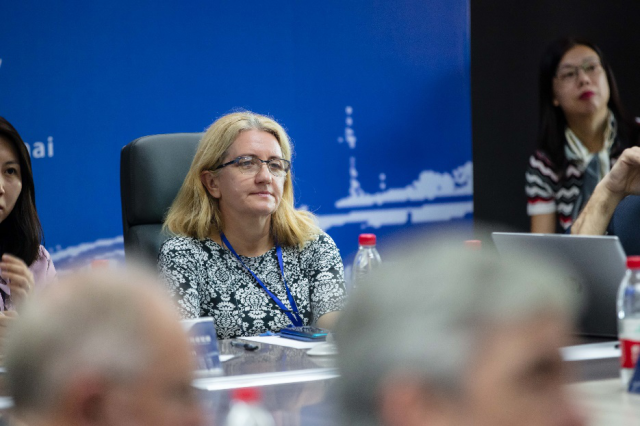
Adriana Biedroń (Ph.D. University of Adam Mickiewicz, Poznań, Poland) is Professor of English at the Faculty of Philology, Pomeranian University in Słupsk, Poland. Her main areas of interest are SLA theory and research, individual differences in SLA, in particular, foreign language aptitude, working memory, intelligence, personality factors and linguistic giftedness. Her recent publications include "Foreign language aptitude: Yesterday, today and tomorrow" (co-authored with Zhisheng Edward Wen and Peter Skehan, 2017, Language Teaching), "New conceptualizations of linguistic giftedness" (co-authored with Mirosław Pawlak, 2016, Language Teaching) and “Polish Listening Span: A new tool for measuring verbal working memory” (co-authored with Mirosław Pawlak and Katarzyna Zychowicz, Studies in Second Language Learning and Teaching, 2017).
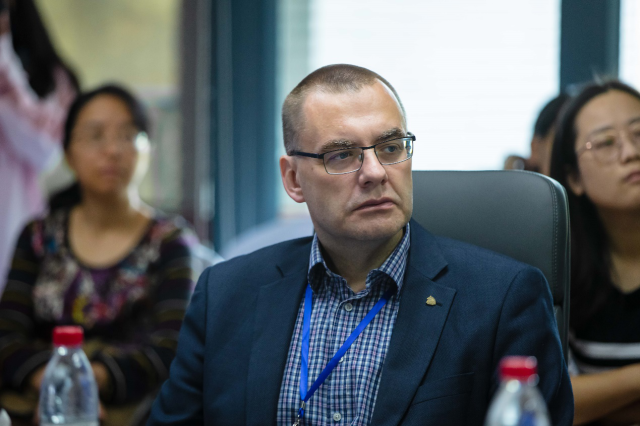
Mirosław Pawlak is Professor of English in the English Department, Faculty of Pedagogy and Fine Arts of Adam Mickiewicz University, Kalisz, Poland, and Department of Research on Language Learning and Teaching, Faculty of Philology, State University of Applied Sciences, Konin, Poland. He is also currently Rector of State University of Applied Sciences, Konin, Poland. His main areas of interest are SLA theory and research, form-focused instruction, corrective feedback, pronunciation teaching, classroom discourse, learner autonomy, communication and learning strategies, grammar learning strategies, motivation and willingness to communicate. His recent publications include Error correction in the foreign language classroom. Reconsidering the issues (2015, Springer), Willingness to communicate in instructed second language acquisition: Combining a Macro- and Micro-Perspective (with Anna Mystkowska-Wiertelak, 2017, Multilingual Matters), and several edited collections on learner autonomy, language policies of the Council of Europe, form-focused instruction, speaking in a foreign language, classroom-oriented research and individual learner differences. He is editor of the journals Studies in Second language Learning and Teaching and Konin Language Studies, as well as the book series Second Language Learning and Teaching, published by Springer. Professor Mirosław Pawlak is a member of many international associations. He was Secretary General of the Polish Association of Modern Languages in the years 2008-2013 and President of the association in the years 2013-2016. He is currently President of the International Federation of Language Teacher Associations (FIPLV).
Inter- and intra-individual differences of language aptitude and working memory capacity in L2 listening development
Pengyun Chang
Chongqing University, China
Abstract:
This study firstly has explored the complex interconnections among five learner individual differences (LIDs) variables from a CDST perspective, which include language aptitude, working memory capacity (WMC), listening motivation, metacognitive awareness and learning style preferences in the dynamic development of L2 listening. A structural equation model was constructed to test the hypothesis that LIDs variables and their components are complicatedly interconnected through an anonymized survey to 292 Chinese EFL learners. Results reveal that LIDs is an intertwined construct with interacting variables, especially language aptitude and working memory capacity.
Three of the participants were further tracked and observed for 3 years. Resorting to CDST techniques (e.g., min-max graphs and Monte-Carlo analyses). Results suggest that: 1) Min-max graphs depict flux developmental processes of learners’ L2 listening; 2) Each participants’ L2 listening ability dynamically developed with occurrence of unanticipated patterns (e.g., attractors or repellors), which were influenced by the variability participants demonstrated in language aptitude and working memory capacity, revealing the complex nature of the two elements.
Findings of the current study indicate that individual learners demonstrated variability with the influence of a group of interacting LIDs variables (inter-individual differences). Further, the complex nature of language aptitude and working memory capacity confirms the significance of the variability because it can initiate a phase shift or a developmental jump in learners’ language development, which may result in bifurcation (intra-individual differences). Theoretically, this study contributes to the exploration of language aptitude and add to what is known about it. Pedagogically, it offers a better understanding and possible application of language aptitude and working memory capacity in EFL learners’ development toward higher levels of proficiency.
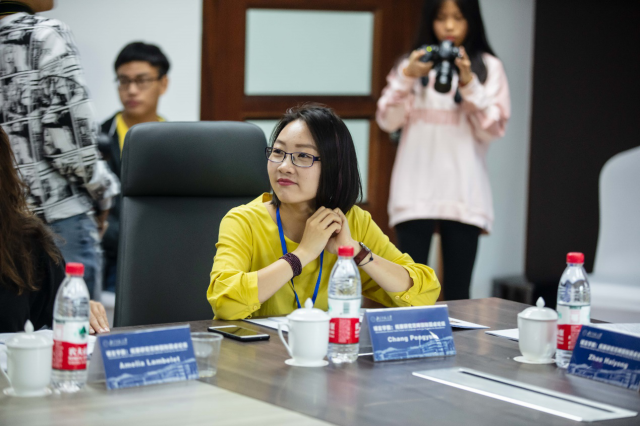
Chang Pengyun, PhD in applied linguistics, is a lecturer in School of Foreign Languages and Cultures, Chongqing University, China. She is a research fellow in the Research Centre for Language, Cognition and Language Application, Chongqing, China. Her current research interest includes second language acquisition, learner individual differences and cognitive learning. Additionally, she is also keen to examine issues related to L2 listening and academic writing, and has published some articles in these fields.
Relationships among L2 learners’ L1 skills, L2 aptitude, and L2 achievement and proficiency
Richard Sparks
Mount St. Joseph University
Abstract:
Increasing numbers of studies have found strong relationships among L2 learners’ L1 skills, L2 aptitude, and L2 achievement and proficiency. Likewise, investigations have revealed significant differences in L1 reading and writing and L2 aptitude of high, average, and low achieving L2 learners. In the present study, U.S. students were administered standardized measures of L1 skills and L2 aptitude, then followed over three years of high school L2 courses (Spanish). At the end of each year, they were administered standardized measures of Spanish achievement (reading, writing, vocabulary, listening comprehension). Multiple regression analyses showed that only L1 word decoding and L1 reading-related skills were significant predictors of students’ L2 aptitude on the MLAT. When the MLAT was also included as a predictor variable of L2 achievement, findings showed that L1 word decoding, L1 writing, L1 reading-related skills (print exposure, vocabulary), and MLAT were significant predictors of L2 reading, writing, and oral language achievement at the end of first- and second-year Spanish courses. However, only the MLAT and L1 print exposure were significant predictors of L2 reading, writing, and oral language achievement at the end of the third-year Spanish course.
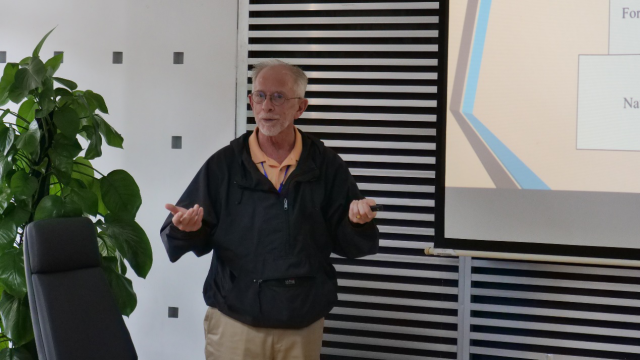
Richard L. Sparks (Ed.D., University of Cincinnati), is Professor Emeritus at Mt. St. Joseph University in Cincinnati, Ohio, where he taught courses in reading science, learning disabilities, educational assessment, and research/statistics. His research interests are reading and reading disabilities (dyslexia), foreign (second) language learning, second language aptitude, individual differences in language learning, and postsecondary learning disabilities. He has published extensively in the native language (L1), second language (L2), and learning disabilities (LD) literature in venues such as Modern Language Journal, Language Learning, Journal of Learning Disabilities, Journal of Educational Psychology, Language Teaching, and Foreign Language Annals, and has published several book chapters in second language volumes. He serves as Consulting Editor for the Journal of Learning Disabilities. Dr. Sparks also has a private practice in which he conducts psychoeducational evaluations and serves as a disability consultant for professional testing agencies and licensing boards. He recently co-edited "Language aptitude: Advancing theory, testing, research and practice" (2019, Routledge), He also serves as a consultant and conducts numerous seminars.
The development of English proficiency in newly arrived Parent-Child Immigrant Pairs: Aptitude, Age, Exposure and Anxiety
Amelia Lambelet
University of Maryland/City University of New York
Abstract:
The study investigated the factors that contribute to successful English-learning among newly arrived adult and children immigrants. Two types of factors are considered: cognitive abilities (aptitude, working memory) and contextual-affective factors (exposure, anxiety). Participants (n=102) are pairs of Spanish-speaking immigrants in the US. Each pair consists of an adult and their child aged 7-14. Their English proficiency is measured using a listening comprehension test, a verbal fluency test, and an oral narrative. The results confirm an effect of aptitude in learning an L2 and show that exposure and anxiety to speak in the L2 are important for both adults and children.

Amelia Lambelet (Ph.D.). Amelia Lambelet holds a PhD from the University of Fribourg, Switzerland, and has worked as a Senior researcher at the Institute of Multilingualism (Fribourg) between 2011 and 2017, leading research projects on receptive multilingualism, bi-literacy development in school and heritage language, lexical diversity, and foreign language aptitude in a school context. Dr Lambelet is currently a Visiting Scholar at the School of Languages, Literatures, and Cultures at the University of Maryland and City University of New York, Hunter College, Language Acquisition Research Center (LARC), working on a longitudinal research project (Swiss National Science Foundation, Advanced Mobility Grant) on age effect and foreign language aptitude outside the classroom. Her research expertise includes individual differences in foreign language learning, receptive multilingualism and heritage speakers’ language development. Her recent books include “Age and foreign language learning in School” (Springer, 2015, with Raphael Berthele), “Heritage and School Language Literacy Development in Migrant Children: Interdependence or Independence?” (Multilingual Matters, 2018, with Raphael Berthele).
Exploring the Relationship between Individual Differences and Implicit L2 Knowledge
Runhan Zhang
Central University of Finance and Economics, Beijing, P. R. China
Abstract:
The ultimate goal of L2 learning is to develop implicit knowledge. However, most studies concerning the factors influencing the development of implicit knowledge focus on the effects of explicit and implicit teaching. From the perspectives of L2 learners, this paper reports on an empirical study investigating the correlation between the starting age of learning English, language analytic ability, learner beliefs and motivation, and implicit L2 knowledge. The results show that:(1) the starting age of learning English is negatively correlated with both measures of implicit L2 knowledge, but only predicts Elicited Oral Imitation performance;(2) the language analytic ability is positively correlated only with and predicts the Elicited Oral Imitation Test performance;(3) the intrinsic interest and affective beliefs are positively correlated with and predict both implicit knowledge measures.

Dr. Runhan Zhang finished her PhD in applied linguistics at the University of Auckland, New Zealand. She is currently an associate professor of linguistics at Central University of Finance and Economics (CUFE), which is a key university in P.R. China. She is now Longma Scholar Young Scholar appointed by CUFE and in charge of the Linguistics and Applied Linguistics Center of School of Foreign Studies at CUFE. Her research interests are mainly on second language acquisition and pragmatics, implicit/explicit learning- and individual differences-related topics in particular. She has published articles in these fields in journals including Studies in Second Language Acquisition(SSLA), Applied Linguistics Review, International Journal of English Linguistics and a book Investigating Linguistic Knowledge of a Second Language with Peter Lang.
College Students’ Writing Self-Efficacy and Writing Self-Regulated Learning Strategies in Learning English as a Foreign Language
Chuang Wang
University of Macau
Abstract:
This study aims to examine how writing self-efficacy and writing self-regulated learning (SRL) strategies are related to writing performance among college students in an English as a foreign language (EFL) context. The Questionnaire of English Writing Self-Efficacy (QEWSE) and the Questionnaire of English Writing Self-Regulated Learning Strategies (QEWSRLS) were administered to 319 sophomore Chinese students. Their writing performance was measured by their writing scores on the writing section of the College English Test Band 4 (CET-4). The results show that EFL students reported a moderate level of self-efficacy and infrequent use of SRL strategies in the course of writing. Moreover, both writing self-efficacy and writing SRL strategies contributed significantly to the prediction of students’ writing performance. Since self-efficacy and self-regulation are crucial to students’ writing proficiency, the current study provides classroom teachers with insights about how to incorporate instructions into EFL classrooms to improve students’ writing outcomes.
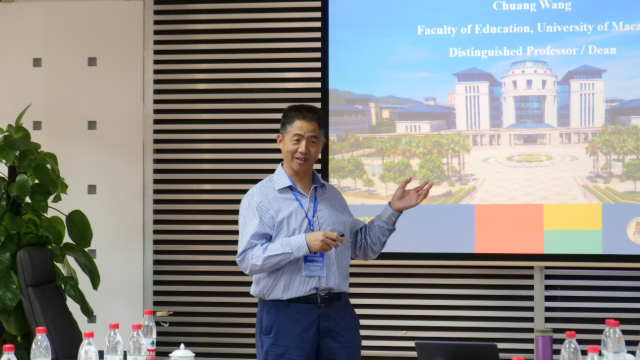
Chuang Wang received his doctorate degree from The Ohio State University in 2004. He is Distinguished Professor and Dean of the Faculty of Education at the University of Macau. His expertise includes educational research design, statistical data analyses, and program evaluation. He has published 7 books, 19 book chapters, 105 peer-reviewed journal articles, and 12 conference proceedings. Dr. Wang also has 20 invited presentations and 98 paper presentations at national and international academic conferences. Dr. Wang is the recipient of the 2019 International Education Award and the 2018 Harshini V de Silva Graduate Mentor Award at University of North Carolina at Charlotte in the United States. He received the 2008 American Educational Research Association (AERA) Distinguished Paper Award, 2009 Excellence in Research Award from the College of Education, 2010 Distinguished Research Award from the U.S. Academy of Educational Leadership, and the 2012 College of Education Excellence in Teaching Award. He served as the Editor-in-Chief of two peer-reviewed journals: (a) New Waves – Educational Research and Development; and (b) Journal of Applied Educational and Policy Research. He also served as the President of the Chinese American Educational Research and Development Association (2008-2010).